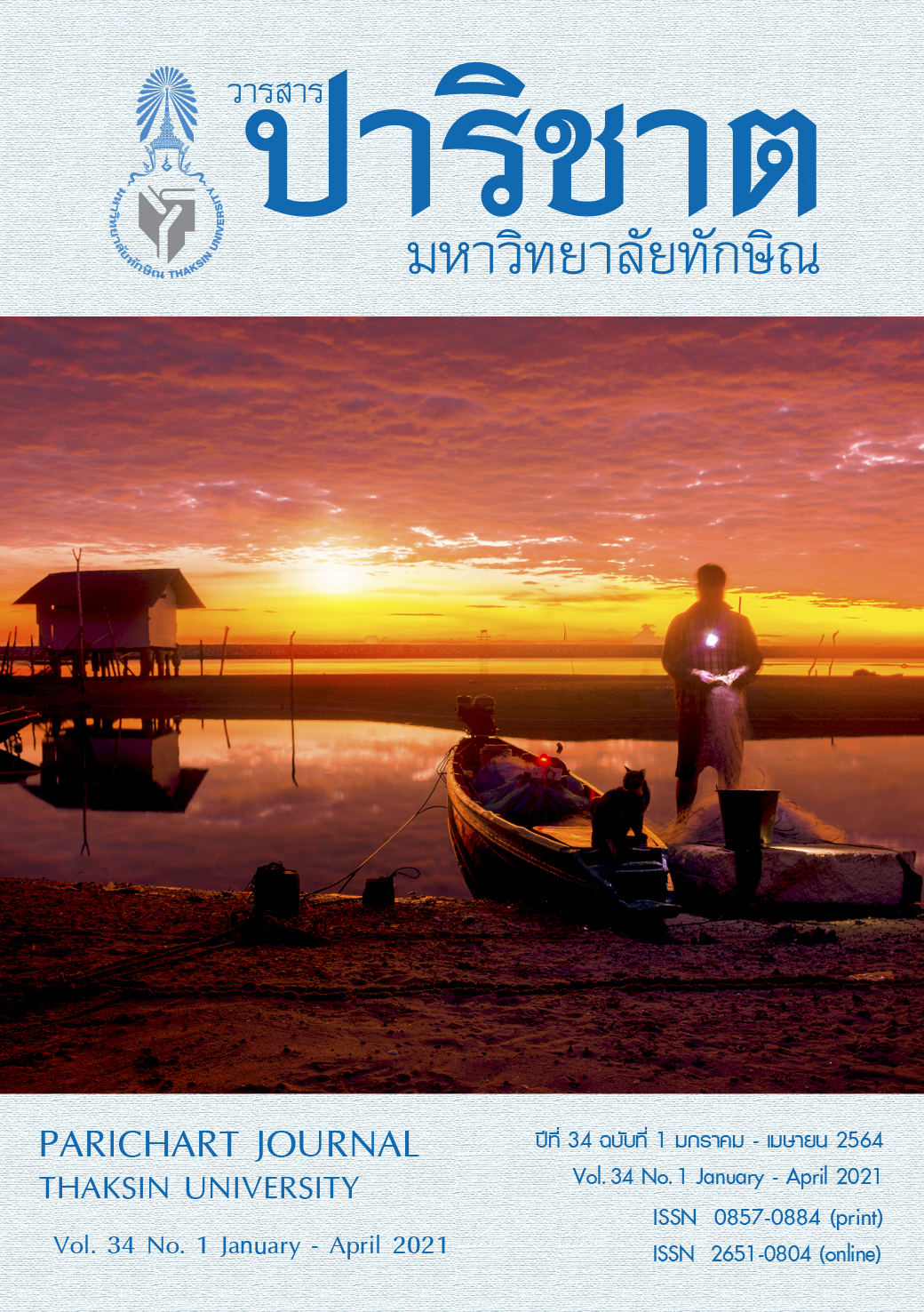Communication Etiquette for Thais’ Usage of Social Media
Main Article Content
Abstract
Cultural changes in the era of globalization, especially in the area of communication etiquette for Thais’ usage of social media, are following a revolutionary technology. The freedom to use social media without limits leads to inappropriate communication according to Thai culture. This research therefore aimed to study the behavior and etiquette of communication in social media of the Thai people, namely what were they look like?, how was communication etiquette in social media consistent to or different from real life?, and should there be any ways to apply real-life etiquette to be used in online communities? This research is a qualitative research. Data were collected by a non-participant observation regarding the communication behavior of Facebook users. And an in-depth interview was conducted with a sample of 40 people using an accidental sampling. Data were analyzed according to the principles of the study of phenomenology in Hermeneutic Phenomenology. The results of the research revealed as follows. 1) There were 2 ways of communication behavior which were work and emotion - society. 2) It was found that the manner in the communication through social media was stable but linked to the cultural dimension proposed by Geert Hofstede. 3) Real-life communication etiquette was consistent with social media when identity was revealed in it. and 4) The respondents believed that cultivating real-life communication etiquette would enable them to communicate in social media with good etiquette.
Article Details
References
Kemp, S. (2019). Digital 2019: Thailand. Retreived March 12, 2020, from https://datareportal.com /reports/digital-2019-thailand.
Namtip, W. (2015). Social Network in a Networked Society. TLA Research J, 8(2), 119−127. (In Thai)
Euamornvanich, P. (2017), Intercultural Communication. Management Science Rajabhat Maha-Sarakham University Journal, 2(3), 98. (In Thai)
Euamornvanich, P. (2017), Communication through multi-cultural dimensions of Geert of Stede. Journal of Humanities and Social Sciences Burapha University Journal, 25(47), 223. (In Thai)
Hofstede Insight, (2020). Country Comparison Tool. Retrieved March 12, 2020, from https://www.hofstede-insights.com/country-comparison/thailand/.
Levitan, L. C., & Visser, P. S. (2008). The Impact of the Social Context on Resistance to Persuasion: Effortful versus Effortless Responses to Counter-Attitudinal Information. Journal of Experimental Social Psychology, 44(3), 640–649.[7] Vivatananulul, M. (2557). Online Social Networks and Intercultural Communication in Thai society. Journal of Liberal Arts, Prince of Songkla University, Hat Yai Campus. 6(2), 63−78. (In Thai)
Suwanbundit, A. (2017). Online in the View of Heidegger. Retrieved May 25, 2020, from https://philosophy-suansunandha.com/2017/08/01/online-in-the-view-of-heidegger/.
Creating user accounts, (2020). Creating User Accounts. Retrieved March 12, 2020, from https://web.facebook.com/help/570785306433644?helpref=hc_global_nav.
Pilanowat, O. (2003). Communication Behavior Unit 1-8 (8th ed.). Sukhothai Thammathirat University. (In Thai)
Royal Institute . (2013). Royal Institute Dictionary 2011 (2). Bangkok: The Royal Institute.(In Thai)
Phromyoo, C. (1983). Understanding about Thai Society. Bangkok: Odeon Store. (In Thai)
Homphun, T. (1995). Thai Language for Business. Bangkok: Wang Aksorn. (In Thai)
Sriwong. S. (1995). Etiquette in Thai Society. Bangkok: Ton Aor. (In Thai)
Thepkampanath A. (2013). Interesting Things about Social Etiquette. Retrieved March 12, 2020, from https://www.m-culture.go.th/songkhla/ewt_news.php?nid=307&filename=index.
Ministry of Culture. (2013). Speech Etiquette. Retrieved March 12, 2020, from https://www.m-culture.go.th/young/ewt_news.php?nid=349&filename=CultureArticle.
Simahasan, A. (2010). Social Studies, Religion and Culture, Primary 5, Instructor: Learning Media Basic Courses, Standard Master Course Set, Core Courses According to the core curriculum of basic education, 2008. Bangkok: Aksorncharoenthad. (In Thai)
Kanchanatanee, K. (2012). The Influence of Cultural Differences on the Adoption of E-Marketing of Small and Medium-Sized Enterprises in Thailand, Journal of Interdisciplinary Research: Graduate Studies 1(2), 55-62. (In Thai)
Detnakarin, S., & Rurkkhum, S. (2015). The Effects of Cultural Dimensions on a High Performance Work System: An Integrative Literature Review. Journal of Management Sciences, 32(2), 207. (In Thai)
Vivatananulul, M. (2557). Intercultural Communication (2). Bangkok: Publisher of Chulalongkorn University. (In Thai)
Pothisita, C. (2009). Science and Art of Qualitative Research. (4). Bangkok: Amarin Printing & Publishing Public Company Limited. (In Thai)
Thepkampanath A. (2013). Interesting Things about Social Etiquette. Retrieved March 12,2020, from https://www.m-culture.go.th/songkhla/ewt_news.php?nid=307&filename=index.
Ministry of Culture. (2013). Speech Etiquette. Retrieved March 12, 2020, from https://www.m-culture.go.th/young/ewt_news.php?nid=349&filename=CultureArticle.
Simahasan, A. (2010). Social Studies, Religion and Culture, Primary 5, Instructor: Learning Media Basic Courses, Standard Master Course Set, Core Courses According to the core curriculum of basic education, 2008. Bangkok: Aksorncharoenthad. (In Thai)
Kanchanatanee, K. (2012). The Influence of Cultural Differences on the Adoption of E-Marketing of Small and Medium-Sized Enterprises in Thailand, Journal of Interdisciplinary Research: Graduate Studies 1(2), 55-62. (In Thai)
Detnakarin, S., & Rurkkhum, S. (2015). The Effects of Cultural Dimensions on a High Performance Work System: An Integrative Literature Review. Journal of Management Sciences, 32(2), 207. (In Thai)
Vivatananulul, M. (2557). Intercultural Communication (2). Bangkok: Publisher of Chulalongkorn University. (In Thai)
Pothisita, C. (2009). Science and Art of Qualitative Research. (4). Bangkok: Amarin Printing & Publishing Public Company Limited. (In Thai)
Chamaiporn. (2019, 5 June). Interview by Kunakorn Kongjan [Tap recording]. Bangkok.
Lek. (2019, 3 June). Interview by Kunakorn Kongjan [Tap recording]. Patumtani.


